Key takeaways:
- Cultural exchange programs encourage global connections and mutual understanding, enhancing personal growth and broadening perspectives.
- Feminist fashion merges style with empowerment, challenging societal norms and promoting sustainability, thus reshaping cultural narratives.
- Engaging with diverse cultures through fashion highlights the significance of personal and collective identity, fostering conversations that challenge the status quo.
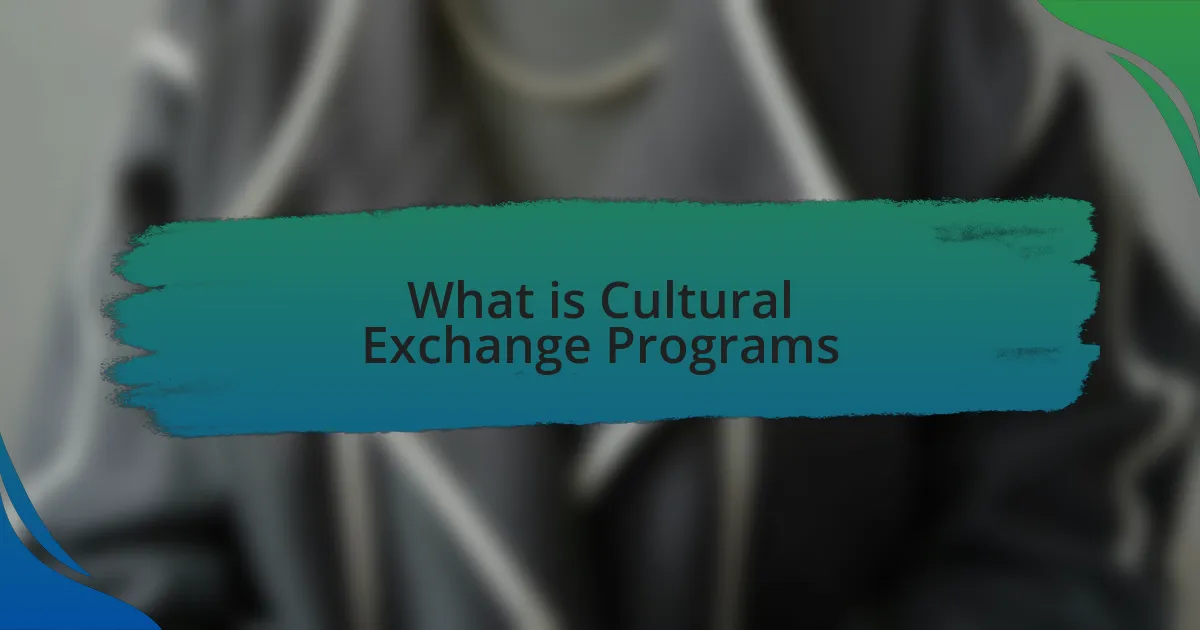
What is Cultural Exchange Programs
Cultural exchange programs are structured initiatives that allow individuals to immerse themselves in another culture while sharing their own experiences and perspectives. These programs typically involve travel, education, or work opportunities, fostering connections that transcend borders. I remember the excitement I felt standing in a busy market in a foreign country, completely surrounded by vibrant colors and unfamiliar sounds, thinking, “What a different world I’m a part of!”
At their core, these programs aim to cultivate mutual understanding and respect among diverse communities. During my time in one such program, I was paired with a local host family who introduced me to their traditions and daily life. It struck me how, despite our varied backgrounds, we found common ground in our stories, aspirations, and even challenges.
The impact of cultural exchange goes beyond mere learning; it shapes our identities and broadens our perspectives. Have you ever wondered how getting to know someone from a different culture could change your worldview? I found that every conversation I had opened a door to new ideas and insights that enriched my understanding of both their culture and my own.
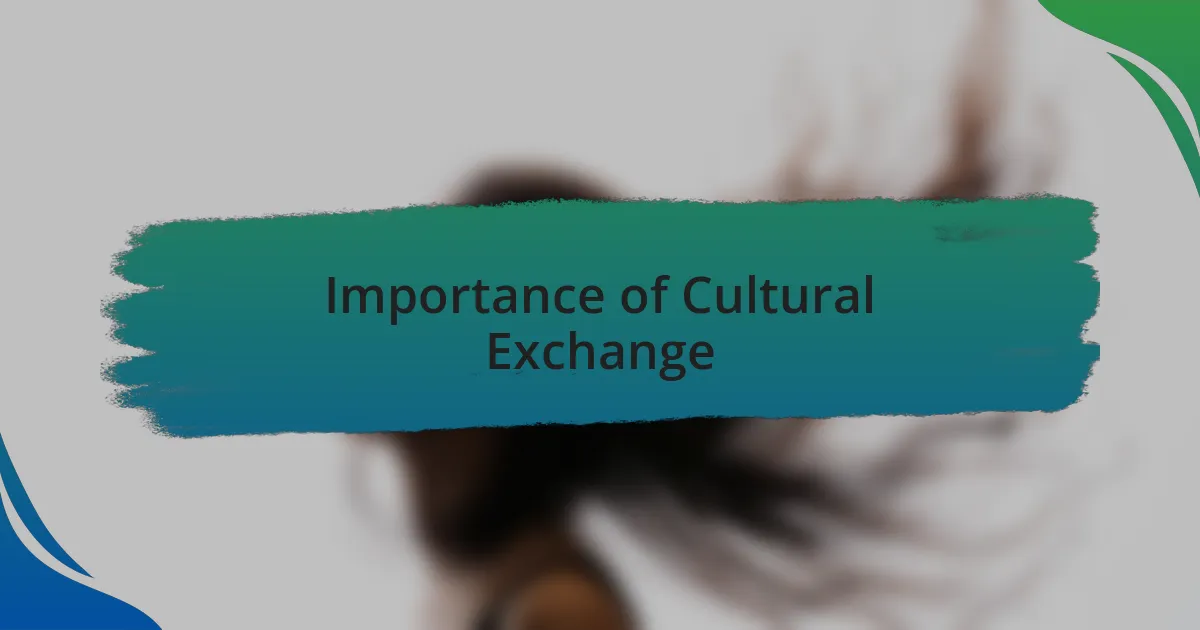
Importance of Cultural Exchange
Cultural exchange is essential because it lays the groundwork for empathy and understanding in an increasingly globalized world. I vividly recall attending a traditional dance recital in a host country. As I watched, I felt a powerful connection, realizing that the essence of their storytelling was not so different from my own cultural narratives. It was a moment where language barriers fell away, reminding me that we all seek connection and expression in our unique ways.
Participating in cultural exchange has a profound effect on personal growth. I once shared my own cultural traditions during a community event, which led to unexpected conversations about feminism and fashion. Those dialogues opened my eyes to how societal norms can be both restrictive and empowering, no matter the culture. Have you ever experienced a moment where your understanding of your own identity shifted simply by engaging with someone else’s perspective? I have, and it was both enlightening and liberating.
Ultimately, cultural exchange cultivates not only knowledge but also a sense of responsibility towards our global community. When I returned home, I felt compelled to advocate for inclusivity and representation in the fashion industry, inspired by the diverse beauty I witnessed firsthand. Each story shared was a reminder that our differences are not to be feared but celebrated, as they enrich the fabric of our collective experience.
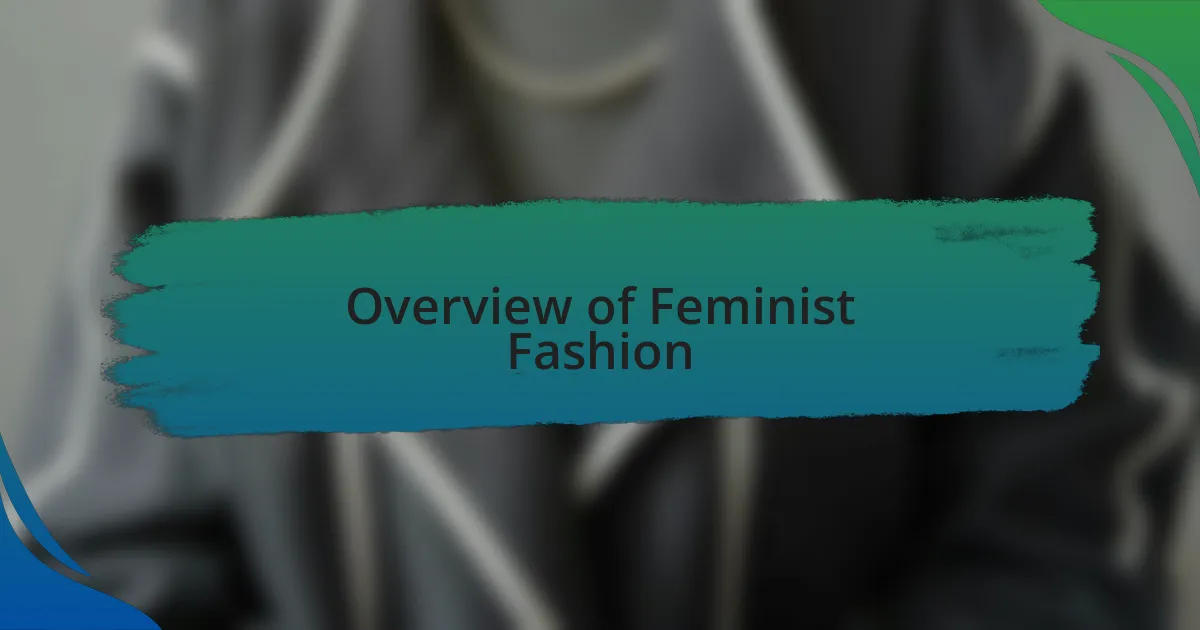
Overview of Feminist Fashion
Feminist fashion is a movement that embraces the intersection of style and empowerment, challenging the traditional confines of what fashion should represent. I remember browsing through a vintage market once, where I stumbled upon a collection that celebrated women’s narratives through clothing. Each piece seemed to tell a story of defiance and individuality, sparking a realization within me: fashion can indeed be a powerful medium for expressing feminist ideologies.
What’s fascinating is how feminist fashion not only champions women’s rights but also promotes sustainability and ethical practices. I once attended a panel on eco-conscious clothing brands led by inspiring women who turned their passion into activism. Listening to their stories, I felt a surge of inspiration—why can’t our choices reflect both beauty and our values? This thought ignited my journey toward embracing apparel that represents both my beliefs and style.
Moreover, feminist fashion often pushes back against societal norms, encouraging individuals to challenge beauty standards. I recall wearing an outfit that boldly blended styles from various cultures, and the accompanying conversations about identity and appropriation were eye-opening. Have you ever worn something that ignited a discussion about the deeper issues it represented? The experience was a reminder that fashion is not merely about aesthetics; it’s a canvas for cultural dialogue and activism.
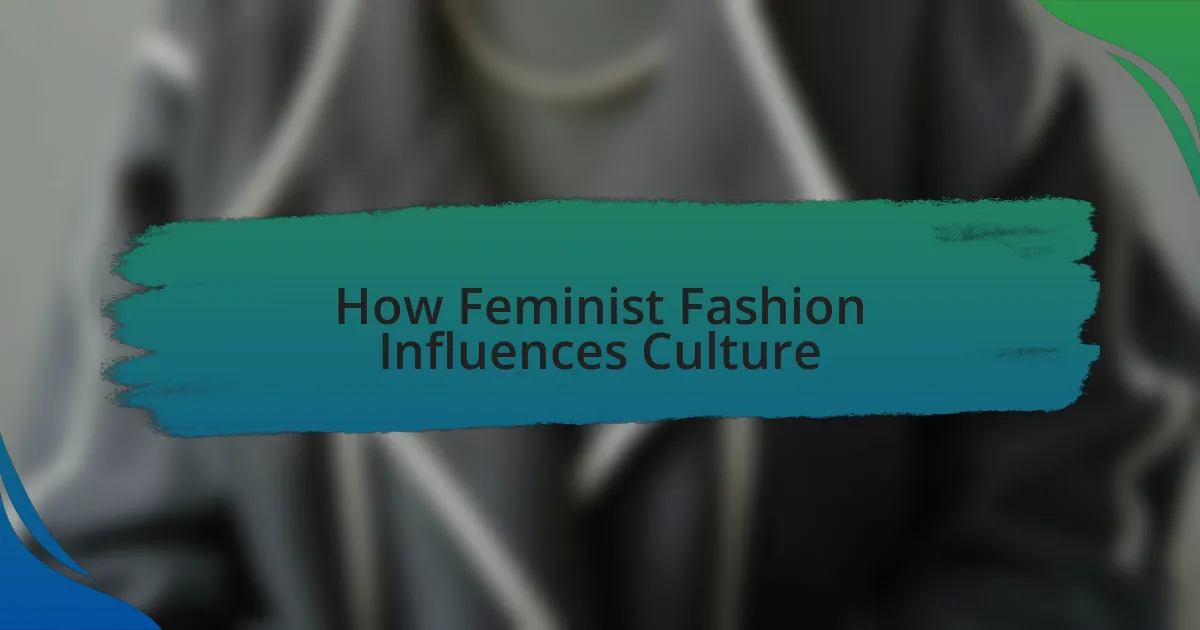
How Feminist Fashion Influences Culture
Feminist fashion significantly alters cultural narratives by transforming the way we perceive women’s roles in society. I recall attending a fashion show where all the models were diverse in size, age, and ability, challenging the typical runway standards. It wasn’t just a visual spectacle; it sparked conversations about representation that continued long after the show ended. How often do we discuss the impact of inclusivity in fashion on our everyday lives?
Additionally, the integration of feminist messages into clothing designs serves as a catalyst for broader societal change. Wearing a t-shirt emblazoned with a phrase like “Empowered Women Empower Women” became more than just a fashion statement for me; it was a call to action. It prompted discussions with strangers, compelling them to share their own stories of empowerment. Have you ever noticed how a simple outfit can resonate with those around you and ignite conversations that challenge the status quo?
Furthermore, feminist fashion encourages us to rethink our consumer habits. I remember shifting my focus to brands that prioritize fair labor practices and environmentally conscious materials. This shift not only empowered me but also influenced my friends, creating a ripple effect of mindful consumption in my circle. Isn’t it remarkable how our fashion choices can inspire others to reflect on the larger implications of their buying decisions?
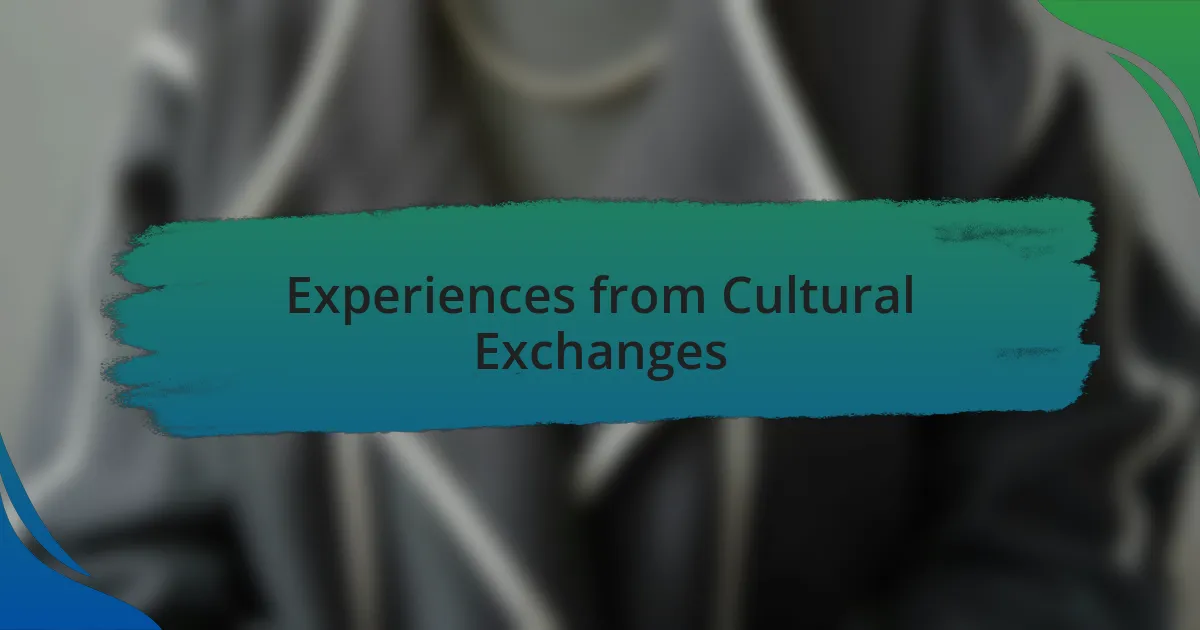
Experiences from Cultural Exchanges
Diving into cultural exchange programs has been a transformative journey for me, particularly in understanding diverse perspectives on fashion and identity. I vividly remember a workshop in Morocco where local artisans shared their craft, blending traditional techniques with modern influences. It was a moment that sparked a realization: fashion is not just about aesthetics; it’s deeply rooted in the stories and struggles of different communities. Have you ever felt that connection through something as simple as clothing?
One of the most profound experiences I had was during a home stay in Japan, where I engaged with women who used fashion as a form of self-expression against societal pressures. They taught me how kimonos, once seen strictly as cultural attire, have evolved to be symbols of empowerment and personal choice. It was inspiring to witness their resilience and the way they melded tradition with modern feminist ideals. Doesn’t it make you think about how clothing can carry such weight in conveying personal and cultural narratives?
Reflecting on these experiences, I often think about how much we can learn from each other when we step outside our comfort zones. Engaging with women from different backgrounds has taught me that our fashion choices can be powerful statements about our identities. Each exchange has reinforced my belief that understanding cultural nuances brings us closer, stirring deeper conversations within the fashion community. Have you ever considered how the threads of our garments connect us globally?